Interdisciplinary Graduate Programs at Ohio State are graduate programs that by nature have academic areas that work across departments and/or colleges to connect faculty and courses under curricular models for a specific field of study. Under the Graduate School, five programs that offer an interdisciplinary approach to a graduate career.
- Ohio State Biochemistry Program (PhD)
- Biophysics Program (PhD)
- Environmental Sciences Graduate Program (MS/PhD)
- Molecular, Cellular, and Developmental Biology Program (PhD)
- Neuroscience Graduate Studies Program (PhD)
More can be read about interdisciplinary graduate programs in section 7 of the graduate handbook
Ohio State Biochemistry Program (PhD)
The Ohio State Biochemistry Program (OSBP) is an interdisciplinary graduate program that trains students to investigate the biochemical basis of life and disease. In the program, students earn a Ph.D. in Biochemistry after conducting original research in world-class laboratories. The interests of our faculty range from understanding fundamental biochemical pathways to dissecting molecular mechanisms that underlie human diseases. The training of our students is therefore equally broad, from basic physical biochemistry, structural biology and molecular genetics, through designing treatments for disease. Our students learn theoretical and practical aspects of biochemistry, gain skills in presenting their research, attend national and international scientific conferences, and participate in a seminar series with world-renowned speakers.
Administration
Director, Dr. Charles Bell, bell.489@osu.edu, 614 688-3115
Associate Director, Tom Magliery, magliery.1@osu.edu, 614-247-8425
Program Manager, Lucy A. Omar, M.Ed., osbp@osu.edu, 614 292-1463
Program Assistant, A.J. Minney, osbp@osu.edu, 614-292-1463
OSBP Graduate Program Student Highlights
Joe Kanlong, PhD Candidate
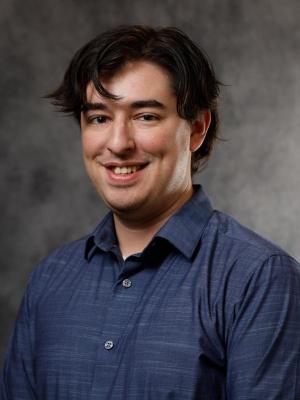
OSBP has an extremely diverse group of faculty that perform top-notch biochemical research, and the interdisciplinary nature of the program provides students with the opportunity to study in a range of fields. Collaborations between labs and scientific resources are plentiful – if you want to perform an experiment outside of your field of expertise, there’s a way to make that happen!
OSBP has a strong student community that promotes interactions outside of the lab, not only with OSBP students, but also with students in other IGPs, led primarily by the OSBP graduate student organization, the Buckeye Biochemistry Club. I also enjoy the annual IGP symposium - this gives students opportunities to show off their research and learn about what other members of the program are working on. One of the most beneficial features of the program is the lack of a TA requirement, providing you with the time to focus on lab rotations in your first year and choose the lab that is the best fit for you!
Biophysics Program(PhD)
Biophysics applies the principles and techniques of physics to biology. More exactly, biophysicists use physics and its related sciences of physical chemistry, electrical engineering, mathematics, and computer science to research basic biological questions. Sometimes, though, the physics necessary to answer a biology research question hasn't been developed yet, so a biophysicist may do basic research in the physical sciences as well.
Administration
Co-Director, Dr. Mark Foster, foster.281@osu.edu, 614-292-1377
Co-Director, Dr. Gunjan Agarwal, agarwal.60@osu.edu, 614-292-4213
Program Manager, Kiley Morgan-Myrick (she / her / hers), biophysics@osu.edu, 614-292-5626
Program Assistant, A.J. Minney, biophysics@osu.edu, 614-292-5626
Biophysics Graduate Program Student Highlights
Sarah Sturgill, PhD Candidate
My favorite part about the Interdisciplinary Biophysics Graduate Program is the intrinsic flexibility of the studies. The Biophysics program spans four different focuses (cellular and integrative, spectroscopy, computational, and structural biophysics) and the coursework is adaptable to the studies in the research labs. I was attracted to this program because of the vast opportunities available to me as a student in the interdisciplinary biophysics program. As a student that did not know exactly what I wanted to research, I was able to explore different fields of study and experimental techniques before finding a lab that suited my interests. By joining the Biophysics program, I opened a wide array of possibilities for my future. Not only do I have access as a graduate student to different disciplines, but my coursework can be tailored to my research interests. This is a unique asset of the biophysics program that highlights the programs interdisciplinary approach to science.
Environmental Sciences Graduate Program (MS/PhD)
The dominant environmental problems of the next century will be those of an interconnected and changing world. Our environment faces many challenges like soil health, water and air quality, climate change and biodiversity loss, growing lists of toxics, infectious diseases emergence and reemergence, limited access to life’s critical resources, needed adaptability through sustainability and resiliency, and shifting policy and governance landscapes. These are just some of the challenges we face, and they require scientists and professionals who have the interdisciplinary training needed to collaboratively solve these interconnected, global problems.
Establishment of the Environmental Sciences Graduate Program (ESGP) was initiated in April 1989 and has evolved to address these complex challenges. Our interdisciplinary graduate program spans four OSU Colleges: Arts and Sciences, Engineering, Food, Agricultural and Environmental Sciences, and Public Health. ESGP students work with their advisor and committee to examine multi- and transdisciplinary questions that address environmental quality and human health, and technologies to improve both. Our curriculum provides graduate students with training in biological and health sciences, physical sciences and engineering, and social sciences and policy. We also offer graduate specializations in Microbiome Science, Agricultural Science, Climate Change Science and Policy, Water Science and Environmental Health. ESGP provides sound training in professional development, including presentation skills, grant writing and data analysis. Our graduates are poised to be the next generation of leaders in Environmental Sciences research and application. 79, and the average GPA is 3.39. Students receive OSU Fellowships and Graduate Teaching Assistantships on a competitive basis.
Administration
Co-Director, Dr. Nick Basta, basta.4@osu.edu, 614-292-6282
Co-Director, Dr. Mary Gardiner, gardiner.29@osu.edu
Program Manager, Kelly Malone, enviro@osu.edu
Program Graduate Assistant, Margeaux Joe, enviro@osu.edu
Environmental Sciences Graduate Program Student Highlights
Christopher Vadala, PhD Candidate
The culture – everyone in the program (faculty/staff, students, etc) are all extremely supportive and willing to help. No matter where on campus, what you’re studying, or your progress in the program, people are always available for questions, discussions, or collaboration. I have never felt I was ‘competing’ with others in NGP, we are all here for the same purpose and will do whatever is needed to make sure we all succeed.
If you can dream it, it is possible with NGP. This program and Ohio State has access and expertise in pretty much any technique, device, or research area you can conceive us. This gives limitless possibilities to your graduate work and ensures that nothing is too far-fetched or technical for you to learn.
The diverse faculty. NGP has faculty members from many departments across the university. This cross-disciplinary system expands research beyond the topics you may be familiar with (development, neuroinflammation, behavior, etc) and allows you to perform your graduate work in labs within the College of Dentistry, Engineering, and others.
Meretta Hanson, PhD Candidate
I love how collaborative labs within the program are. I've had the opportunity to learn a ton both within my lab and by working with others.
I definitely recommend it! It's a strong program with great faculty and a friendly student body. I've been incredibly happy with my time in this program, and I feel well-prepared for whatever comes next.
Aravind Kalathil, PhD Candidate
I absolutely love my cohort! They are a great group of people I can talk to and who are always willing to help no matter what's going on with work, class, or life in general. In terms of joining, I would say that the faculty here are pretty amazing and I would encourage people to explore their options with rotations. It's a great opportunity not just to find the lab they want to join, but also learn a lot about adjacent research and make more connections. Furthermore, the PI I ended up joining wasn't even a part of OSU or the NGP when I applied since there are so many faculty joining and the program is expanding. Without looking around and filling all my rotations, I don't know if I would have found this lab and I'm very happy I did!
Joey Smith, PhD Candidate
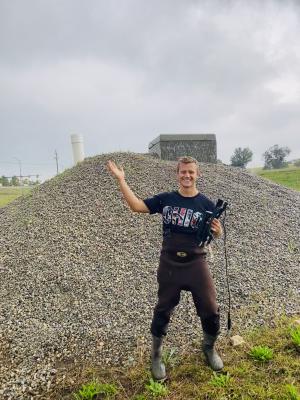
My research investigates factors that impede the social acceptance of urban stormwater control measure technology. This topic requires interdisciplinary collaboration across the biological, physical, and social sciences. I chose the interdisciplinary ESGP program over a discipline-based program because it encourages and requires students to take classes and conduct research across environmental science disciplines. Addressing our most pressing environmental challenges requires collaboration across disciplines and across international borders, and ESGP has allowed me to do just that.
Molecular, Cellular, and Developmental Biology Program (PhD)
The graduate program in Molecular, Cellular, and Developmental Biology (MCDB) is a cutting-edge student-centered interdisciplinary doctoral training program in the molecular life sciences. Our mission is to prepare students for careers as research scientists, educators and leaders in an academic or industrial environment. With more than 220 mentoring faculty spanning seven colleges, students that enter our program have unparalleled options across the breadth of molecular life science research, from basic to translational. We are proud of our collegial, inclusive, and supportive culture which is focused on developing students to be critical and independent thinkers trained in state-of-art scientific approaches.
Administration
Co-Director, Dr. Anthony Brown, brown.2302@osu.edu, 614-292-1205
Co-Director, Dr. Dawn Chandler, chandler.135@osu.edu, 614-722-5598
Program Manager, Amanda (Mandy) Hargett, mcdb@osu.edu, 614-292-2804
Program Assistant, Michael Smoley, mcdb@osu.edu, 614-292-2804
Program Contact, mcdb@osu.edu, 614 292-2804
MCDB Student Highlights
Jessica Herstine, PhD Candidate
Jessica Herstine is a 4th year MCDB Student in the laboratory of Dr. Allison Bradbury in the Department of Pediatrics at Nationwide Children's Hospital. Her favorite part of MCDB are the diverse research opportunities available, the opportunity to do rotations and find the right fit in a laboratory. She recommends students step out of their comfort zone and engage with PI’s and other students about research experiences as it helps to provide insight into your program and helps you better understand your career goals. She notes that MCDB is unique in that it has a diverse faculty and student population, which provides depth and breadth to your research.
Yogesh Budhathoki, PhD Candidate
Yogesh Budhathoki is a 2nd year student in the laboratory of Dr. Ryan Roberts. He notes how MCDB empowers students to rotate and explore their interests prior to committing to a lab and that the strength of MCDB and OSU lies in the combination of resources and the diverse research areas available. From state of the art facilitates to a vibrant community of researchers across disciplines, you will find everything you need to thrive! MCDB goes above and beyond in not just preparing you for academics but also fosters essential soft skills needed to be successful.
Kenzie Turner, PhD Candidate
Kenzie Turner is a 3rd year MCDB student in the laboratory of Dr. Chris Breuer. Her favorite thing about MCDB is the strong sense of community and mutual respect and support among students. Students genuinely celebrate each other’s accomplishments and provide support throughout the PhD journey. She recommends that students interested in joining MCDB to reach out to potential PI’s and have possible rotations in mind before starting. Taking some initial steps can set you up for success both academically and personally. Lastly, the co-directors of MCDB are truly passionate about supporting students and helping PhD students thrive.
Neuroscience Graduate Studies Program (PhD)
The Neuroscience Graduate Program (NGP) at Ohio State has participating faculty members who represent five different colleges and many participating university departments including Biosciences, Neuroscience, Neurology, Neurological Surgery, Pharmacy, Psychology, and Psychiatry. Our graduate trainees have the opportunity to work in a highly collaborative research environment at Ohio State with successful and distinguished faculty who have expertise in a wide array of neuroscience-related fields. Our goal is to provide an integrative graduate program in neuroscience with a foundation in course work, advanced research training, and a myriad of opportunities for professional development, networking and community outreach. Our graduate program will help train you to become an independent investigator who is an expert in laboratory research and its associated scholarship such as writing, teaching, and mentoring. With this training, you will be well-positioned to excel as a researcher and neuroscientist within academia, industry, or government.
Administration
Co-Director, Dr. Andy Fischer, fischer.412@osu.edu, 614-292-3524
Co-Director, Dr. Giles Plant, plant.49@osu.edu
Program Manager, Mido Aly, ngp@osu.edu, 614-292-2379
Neuroscience Graduate Studies Program Student Highlights
Loryssa Lake, PhD Candidate
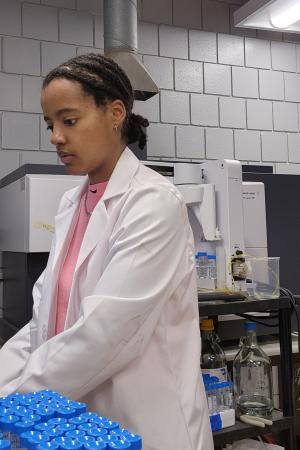
My research focuses on reducing human health exposure risk to pollutants from contaminated urban soils, prioritizing environmental justice areas. Because the needs of my research cross disciplines including environmental chemistry, public health, and environmental law, a traditional graduate program would not have afforded me the ability to explore my interests as easily and efficiently. ESGP promoted courses that aligned with my needs while also allowing me to complete my degree requirements on time. ESGP has been invaluable in helping me to accomplish my academic and professional goals.
Jamison, PhD Candidate
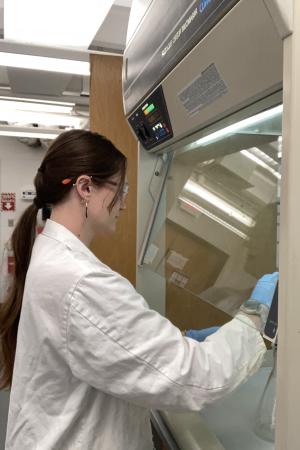
My research focuses on environmental micro and nanoplastics, evaluating their transport and removal in drinking water treatment systems, and how they interact with co-occurring contaminants in the environment. Environmental micro and nanoplastics are an emerging and complex topic that requires an interdisciplinary approach to understand their interactions. I chose the Environmental Sciences Graduate Program because its interdisciplinary foundation allowed me to bridge the gap between my background in environmental science and chemistry in a way that would not have been possible in a discipline-based program.
Gardner, PhD Candidate
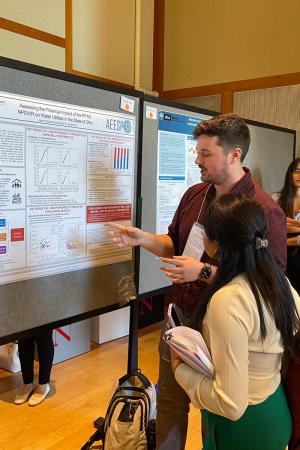
My research focuses on the impact that the newly finalized federal regulation on per- and polyfluoroalkyl substances (PFAS) will have on water affordability in the state of Ohio. As a highly interdisciplinary project which includes the intersection of drinking water engineering, chemistry, and policy, choosing the Environmental Science Graduate Program (ESGP) was the obvious choice for graduate school. Nowhere else would I have the freedom to pursue such a breadth of class topics while also having access to such a diverse group of professors and professionals with experience in all of my research areas.